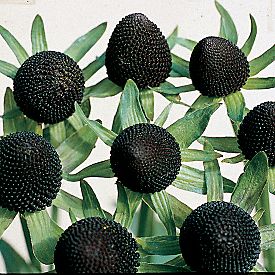 Rudbeckia occidentalis, commonly known as Black Coneflower, is an unusual flower in that it has no petals like other varieties of Rudbeckia. Instead, the black coneflower sports a tall black conehead surrounded only by green sepals around the base of the cone. Because of the lack of petals and the deep black color of the cone, this flower makes the perfect addition to any gothic garden.
Rudbeckia occidentalis, commonly known as Black Coneflower, is an unusual flower in that it has no petals like other varieties of Rudbeckia. Instead, the black coneflower sports a tall black conehead surrounded only by green sepals around the base of the cone. Because of the lack of petals and the deep black color of the cone, this flower makes the perfect addition to any gothic garden.
The black coneflower can be sown from seed early in the planting season. If seeds are planted early enough in the spring, you may get blooms during the first year of growth. Germination occurs at around ten days after planting. The plants typically flower in late summer and tend to grow in clump formations. They can reach a height of four to six feet tall, and do best when planted in areas that receive full sun or little shade. Black coneflowers also prefer moist, humus rich soil. For an added boost to help this flower grow, add some complete organic fertilizer to the soil in the spring. In the fall of the year, these flowers can be divided and root cuttings can be taken late in the fall season or near the beginning of the winter months.
Because of their unique appearance, planting them in a gothic garden along with other black and deep red or deep purple flowers can add a dramatic and mysterious look to the garden. These plants are perennials that will return year after year, so be sure to choose location within the garden carefully. The black cosmos, bat flower, and black pansy are some good choices to plant along with the coneflowers. Try to choose plants that bloom in spring, summer, and fall so that you have flowers most of the growing season. Add more gothic feel to the gothic garden by adding decorative touches such as gargoyle statues, skull statues, or even pretend tombstones.










Speak Your Mind